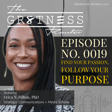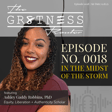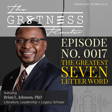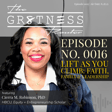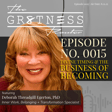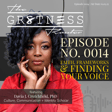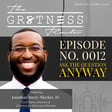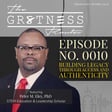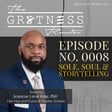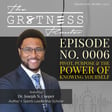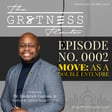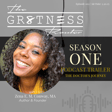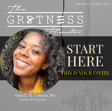Become a Creator today!Start creating today - Share your story with the world!
Start for free
00:00:00
00:00:01

Episode No. 0004: ‘Not Yet’, Isn’t “No”
What if losing your voice meant losing your connection to the world? In this episode of The Greatness Router, Dr. Kelli Uitenham, CCC-SLP, speech-language pathologist and founder of Brain Talk Foundation, shares how speech therapy is about more than words—it’s about restoring identity, independence, and connection.
We dive into the silent epidemic of brain injuries, how they impact everything from daily life to the TBI-to-prison pipeline, and what you need to know to protect yourself and your loved ones.
Follow Dr. Kelli: @drkelly.medicalslp on Instagram, TikTok, & LinkedIn
🎧 Listen now!
Transcript
00:00:08
Speaker
This is the Greatness Router, where we connect purpose to process one conversation at a time.
00:00:22
Speaker
You're listening to The Greatness Router, where purpose meets process, one conversation at a time. I'm your host, Zena C. And today's guest is someone whose work is making a real impact in the world of brain health and speech therapy.
00:00:38
Speaker
Dr. Kelly A. Utenham is a nationally certified speech language pathologist and the founder of Serenity Speech Therapy, where she specializes in adult and geriatric care.
00:00:52
Speaker
She's also an adject adjunct professor at Purdue, where she mentors future professionals with both expertise and compassion. Beyond her clinical and academic work, Dr. Utenham is the founder of Brain Talk Foundation. Boom.
00:01:09
Speaker
a vital platform providing support and awareness for individuals facing neurological challenges. Her dedication to advancing brain health, communication, and education is truly inspiring.
00:01:21
Speaker
And I'm honored to have her on the show today. Dr. Utenheim, welcome to the Greatness Router. Let's dive in. How are you?
00:01:32
Speaker
I am doing very well. Thank you so much for having me. It's an honor to be here. i'm so excited. I'm so grateful for you to find time in your busy schedule to not only spend time with me, you know, because I love you um but also to enlighten our our listeners. And I like to say our listeners because they're not just mine. This is we're sharing audiences right now. And I'm really excited to even open the pathway and the conversation about how And really why you got into what you have, the the pathway you have chosen. So thank you. Thank you. Thank you again for joining us.
00:02:09
Speaker
Thank you for having me. I'm very honored to be here and super excited to share knowledge with our listeners. Woohoo! Let's go. Okay. So I like to have a couple of um icebreakers just to set the tone of our conversation. So my first question is, if you could have a candid, unfiltered conversation with any historical figure, who would it be and why?
00:02:34
Speaker
Oh, yes. How you put candid conversation in. man and Oh, my gosh. Y'all. She has a podcast, but we'll get into it. Conversations with Dr. Kelly. But any figure in history. Yes.
00:02:48
Speaker
o Yes. I kind of want to rock with any of the founders. of our mous so we souroras we're our illustrious sorority Delta Sigma Theta Sorority Incorporated yes I would want to um speak with one of them I respect it yeah I respect that there There's a lot of power and change and fortitude for a lack of greater words, you know, behind, behind our founders. So I respect that. That's what's up.
00:03:22
Speaker
Yeah. I was thinking like, where can I get like the good mix of everything like history and um motivation to keep going, action given the the climate today and just like they started this.
00:03:36
Speaker
and love it. I think that it will be fantastic to have a conversation with. um and I absolutely love that. Okay. All right, sis. Yeah. All right. So my next one is if you could instantly master any new language spoken or signed, which would it be and why? Dutch. Dutch.
00:03:57
Speaker
And that is because I'm having to learn it now. ah Okay. um So my family is um part of our culture and our heritage is from Suriname, which is a small country on the northeast coast of South America.
00:04:13
Speaker
wow In America, we call it Suriname or some people say Surinam, but the language there is Dutch. And instead of me having to learn it like I am now, I would be ah very excited to already have that knowledge. But very much like um people today who come here, their children need them to learn the language. And so my great grandfather was here.
00:04:38
Speaker
um He ended up meeting my great grandmother. They had my grandfather and my great uncle. And he told them, like, do not speak Dutch. I need you to learn English so that you can translate for me. And so that part of our heritage is gone. And now we have to learn it again.
00:04:55
Speaker
and in order to go home, everybody does speak English, but it would be nice to know Dutch as well. So I'm working on that. I feel like you are going to surprise yourself with how ingrained the language may end up being with you or or or attaching yourself to that language. I'm excited. Yeah, I'm excited. I've been to Amsterdam and I just loved that location and and the culture and even the language. So I'm excited to like root you on and cheer you on for this because that is so super amazing.
00:05:26
Speaker
Yeah, I, i may you know, I um really wanted to and be intentional. And so i even got um my favorite saying tattooed on me in Dutch, which is, which means do what makes you happy.
00:05:39
Speaker
which means do what makes you happy And you know that I'm all about that. I got chills when you said that. Did y'all get chills? Because I got chills. Like it just like because it was so fluent. Like you're well rehearsed and well practiced. Girl, I'm excited. I've been studying. I've been taking private classes. less You let me know when we're traveling. you. You'll be my translator and I will just be the hype woman. I'm here for it. I got you. I'm trying to go to Surrey Fest.
00:06:05
Speaker
Let's go. The biggest... It's like carnival. It's like homecoming. It's like the Super Bowl. It's like all it's like a days-long festival. And I would love to go and be able to speak the language. That sounds amazing. I'm excited for you.
00:06:19
Speaker
Thank you. Okay. So thank you for those icebreakers. I think that you have... I've known you for years, but it seems like even now, like I just got our, our, our friendship just got deeper. Like it just like my, my understanding of who you are as a person just got so much deeper. And i think that that is, is monumental for me, but for our listeners to see the depth of how, how deep you can go. So I'm excited.
00:06:46
Speaker
I'm excited. So that being said, let's hop into the router moments. Let's talk about the purpose behind your work. So y'all heard me go into the nitty gritty of what she has, not even the nitty gritty. I kind of just only scratched the surface.
00:07:00
Speaker
um But you are a speech language and speak language pathologist and you do own your own practice. And now you have a foundation under your belt that is enlightening and teaching and educating others on the importance of brain health.
00:07:17
Speaker
um My question is, if you had to pinpoint the very moment that you knew this was your calling, what would it be? That speech was my calling or raising awareness about brain health?
00:07:29
Speaker
Ooh. Cause you hit me with a twofer. i did hit you Well, I hit you with a, I hit you with a, this is what you do. Which way is heavier kind of situation. Which way is heavier? Which way? which Yeah. Which one is the, which one is like the, the front and center. So you can choose. You do not have to answer both because I encourage you all to go and follow Dr. Kelly and, and ask these questions and follow her and listen to information. So yeah. Yeah.
00:07:59
Speaker
You always hit me with a stump question i right out the gate. let's do Let's do speech language then. Let's do speech language. speaks So my my pause comes from through speech therapy, I get to actually treat.
00:08:14
Speaker
And I'm like, hands on. These are the exercises. This is how I can. help you to get better or get back to what you want to be as ah person, as a human. And that could be, you know, someone who has had a stroke and they're not able to speak anymore and then getting them to a place where they can read a bedtime story to their grandkids or say, I love you to their spouse.
00:08:37
Speaker
Or there was one where a woman thought she'd never speak again and she was able to tell her son happy birthday and the tears that that came from that. um Being able to help someone to ah eat their favorite meal again because, you know, they may have had a stroke or some sort of injury and then they have dysphagia, which is a swallowing disorder, and then rehabbing them back to being able to eat. I mean, people take eating for granted because it's just something that we need to do to survive. But there's a whole social engagement and ah cultural incorporation that eating
00:09:14
Speaker
provides And, you know, you and I can say, let's go grab some tea or let's go grab some lunch. And it's a whole thing, you know, but if you are restricted from that and you either can't eat, which means that you're NPO, which means nothing by mouth, or you can only eat something if I put you on a diet for puree, which means all of your food is going to look like baby food.
00:09:33
Speaker
yeah So to bring someone back from that and to rehab them back to like one gentleman just cried his eyes out because he was able to have water and I cleared him for that. So that is definitely a huge calling because I love helping people and to have this skill and this gift from God is um Life-changing for the better, i think.
00:09:58
Speaker
And the brain talk, raising awareness about conditions of the brain, that is another calling because there is there are so many people who are unaware of you know the seriousness of what can happen to the brain, how to protect it.
00:10:16
Speaker
And right now, a big focus that I'm working on is the concussion, and traumatic brain injury, and CTE and athletes space. Um, which is a whole nother conversation that needs to be had. Right. Right.
00:10:28
Speaker
And, um, I was an athlete. You were an athlete. Um, You know, our parents ah encourage us to to get out there and to participate. I understand why parents want their kids to be a part of athletics or teams. There are wonderful positives to it.
00:10:49
Speaker
But I find it unfair, if you will, that there are so many parents who are unaware of the dangers of what can happen to their kiddo. And so they're not knowing what to look for. And when I do these talks, there are always people who come up to me afterwards saying,
00:11:04
Speaker
men and women who will say, i had no idea, or I thought, you know, i just brushed it off as my kid being a moody teenager, or I didn't pay attention to the migraines because we all get migraines in the family. right It's hereditary.
00:11:17
Speaker
And so there can be a lot of ways that parents explain behaviors away, but they're explaining away serious things that can affect their kid down the line. And now we're seeing that there is something called the TBI, which stands for traumatic brain injury, the TBI to prison pipelines.
00:11:34
Speaker
So 40% of people who are incarcerated have a history of a brain injury. And so when you experience that and you start at the pediatric level where these kids are playing sports, you know, yeah, you're telling your kid like, oh yeah, like be tough, get back out there, rub some dirt on it, or you got a little ding and that's okay.
00:11:52
Speaker
But there are kids who will go out, um sit down for a little bit, but then they'll be right back playing. And then they could end up with, you know, showing signs of issues with their memory or issues with behavior. But if they don't have the language to say,
00:12:08
Speaker
something's going on with my brain, mommy, and it hurts. Or for the parents to have the knowledge to take a look, it's an easy way for parents to just brush brush something off. Same thing for educators. And educators are really, really needing to be in the know because they're the ones who can say, this this kid has been having concussions, playing sports or playing outside. We need to take this seriously.
00:12:32
Speaker
But what happens in society is you take it at face value and then you get those kids who are misdiagnosed with obstinance defiance disorder or ADHD or behavioral problems.
00:12:42
Speaker
And they actually have brain injuries going on and they're getting these labels that can hurt them. Right. And teachers, principals, coaches who are less patient because they don't know, oh, there's a brain injury that's going on here and he needs more time, he needs accommodations.
00:12:57
Speaker
And then you end up with that prison pipeline because they could they could be labeled a quote unquote problem child. in school. And then when the police get involved, it can be like, Oh, well, they're a lost cause. They're always causing issues. They're always not recognizing that there's an underlining, not recognizing that there's an underlining issue that that has, that failed to be, be acknowledged. That's deep.
00:13:20
Speaker
Um, um, I can appreciate your two-prong approach. Like, you you are very much on the technical side. Like, let's let's get some action.
00:13:30
Speaker
This is how we um we are we address, you know, things. said difficulty or said, said issue.
00:13:41
Speaker
But I also love how you are also taking the education route too. Like it's, it's two prong and they balance each other. And I respect your work on so many levels.
00:13:53
Speaker
Thank you. How do you choose? How do you choose? Well, see, I wasn't even saying choose. I was just asking asking which one weighs heavier and your response they will Early detailed means they balance each other. Yeah. I respect it. I respect it. Okay. So let's discuss your pivot point because again, you're talking about two different ends of the spectrum here. You're talking application and you are talking education.
00:14:23
Speaker
So, yeah. Was there ever a time when you almost chose a different path? Like, like has speech language pathology always been like, you know what? I just love how, you know, people communicate or I love the idea of helping people, you know, regaining that ability to do so. Like, what was that? Was there ever a time where you just chose this was not your original path and you decided to choose this?
00:14:51
Speaker
Yes, I was a journalism major first. So i was not into speech when I first went to college, A&T, Aggie Pride. and The other blue and gold.
00:15:06
Speaker
The best blue and gold, but we won't get into that. um But i I was a journalism major at first, and that was my passion from fifth grade, believe it or not.
00:15:18
Speaker
I was asked to do the morning announcements. oh grade I sat at that um anchor desk and I was like, this is it. so tele all right teleprompter oh then we had like the the cards they would hold up the cards but so I appreciate that I had parents that and ah nurtured that for me and allowed me to get into spaces and shadow anchors and meet reporters and so I had been around it and I knew um how wonderful it was and then when i graduated from A&T was you know the
00:15:52
Speaker
I don't know if can call that a depression, but was one like nobody was hiring 08, 09. Like it was serious. was rough. Y'all got it rough now, but it was rough.
00:16:02
Speaker
Yeah. Yeah. So nobody was hiring. So I had this beautiful degree and nowhere to be hired. And when I actually, was actually my line sister who got me into speech therapy. She is a speech therapist and she was telling me about it and She was like, you know, we need more black speech therapists, which we really do still need.
00:16:26
Speaker
And from there, I checked out a program and I fell in love with it. And it's just, it's been speech ever since. But now I get to incorporate my journalist skills because of my podcast and now having to be more present on social media, which is not a thing that I planned on, um but you know, you gotta to play ah pivot, use use the social media.
00:16:49
Speaker
And so I get to use the skills that I have for, you know, lighting and makeup and sound and editing and all that good stuff. So everything happens for a reason. not No, big facts.
00:17:01
Speaker
yeah I agree with that sentiment. But I also feel as... Because I was a con major too from Johnson C. Smith University, though. um yeah um as You S.U. you know, so...
00:17:17
Speaker
I feel as though when you are a comms major, especially if you take it seriously, you are required to learn theory and you're required to learn the bare basics of what it takes to communicate effectively.
00:17:31
Speaker
So I think... using those skills and translating them or transposing them or reformatting them so that you are operating in the speech language space is is almost like super power-ish because you are coming from, granted, there's its own set of of information in in s in the world of SLP. I understand that. You often use jargon that I'm just like, okay, sis. As do you.
00:18:00
Speaker
As do I. But ah okay, sis, let's put this back in in fourth grade terms, because that's what they taught us to write in when we were when we were journalism majors. um You write like you're you're speaking to a fourth grader or a fourth grade grader that can read, et cetera, et cetera.
00:18:16
Speaker
So I think that even having that background, right? is even a great layer of opportunity for you and for your foundation as well.
00:18:27
Speaker
I think that that's, that's pretty, that's pretty, I don't know if you ever considered it that from that angle, but I think that that's, that's pretty epic. actually had to, because my, my professors were not pleased that I was leaving the journalism space.
00:18:44
Speaker
And so when I told them that I was going to pursue my master's in speech, um, speech therapy, um they were like, what? What do you mean? Like, you're so good at journalism. Why would you switch? Like, you have this gift.
00:18:59
Speaker
And so I was thinking like, okay, so I always had it in the back of my mind. Like, how am I going to tie these two back together? And so I have been able to do that through the podcast and social media and interviews and all of that. And, you know, that's fantastic. But I have always kept that in the back of my mind. And so I've gone to my professors who I'm still close with to this day. And I've said, look, see, I'm bringing it all back together.
00:19:23
Speaker
It's coming full circle. I promise. Yes. And there's like this um and you know how the HBCU you professors are. So there's theres There's this kind of like auntie, uncle kind of like, yeah, you better. Yes. energy so like I didn't waste my energy on you. I need you to figure out a way to connect these dots, please. Oh my gosh. I taught you better than this.
00:19:45
Speaker
like I love a good HBCU professor. i am. I'm all the way here for it. Okay. So. Let's talk resilience because you are already saying that's a big jump from even though I can draw correlations and I can connect dots, it's still a huge jump between comm space and the SLP space um as well as the foundation space. Like I completely understand that.
00:20:08
Speaker
So that being said, there's a lot of mental agility that's required, a mental agileness that's required to to occupy these different spaces. So what keeps you in the game When things aren't going smoothly. oh Yeah. What keeps you going? Like, what is your, what is your rock? What is your foundation? How can you, what do you, what is your source of strength? Let's go with that.
00:20:33
Speaker
Always God. Well, facts. Yeah. um But remembering myself and centering myself because it's real quick to think,
00:20:47
Speaker
I've got a bad life or I've got a bad year. Like you can, when you're in it, you can really expand it to be way more than what it is. And so I do a lot of self-talk so I can shrink whatever it is that could feel monumental to me.
00:21:03
Speaker
or overwhelming. And so I start with being still. always, you know, pray and it could be something as quick and easy as God help me because I don't know what else to pray. absolutely um Yeah. And so being still and then talking about what I already have blessing wise. So I'm like, I have my health, which is huge because I think about You know, there are so many people who would pay for whatever issue that I could be going through if they could have more time or if whatever ailment would go away.
00:21:33
Speaker
It also helps, you know, with the patients that I see. I work with a lot of people who are in the geriatric age range. And so people who, you know, their memory is going because they may have a dementia diagnosis. So remembering my health.
00:21:48
Speaker
um remembering my happiness, that I'm blessed to actually be happy and to have joy and to know joy, my safety. So just, I go through these small things that, you know, wouldn't be small and if if if it were in reverse, if, you know, my book was in jeopardy or something like that.
00:22:08
Speaker
And so once I can shrink it on back down, then it can be like, okay, I just have a like a lot of reports that I need to write. in And it's not really as big as i mean as as I'm making it out to be like, calm it down and bring it on in.
00:22:23
Speaker
I also like to use the first world problem um statement to kind of rein it on back in or it's like oh man like I've got to go to multiple different events and how am I going to do x y and z and it's like is this a first world problem yes is that an A&T thing is that something y'all acquire from A&T because my brother went to A&T and he says that he like look that's a for granted he came from he comes from the poli sci world but his thing is just like that's a first world problem Zena and I'm just like Oh, i there's no contest to that. Like you're, you're right.
00:22:57
Speaker
Yeah. I don't know. I don't even remember where I first heard it, but I definitely bring it on back. Cause I'm like, there are people with no shoes. There are people with no feet.
00:23:07
Speaker
Water. yeah dragon him also Right. And then talking about TBI, the prison pipeline. I'm like, i also have my freedom. There are some people who are, like meeting with attorneys from a prison ah you know location, trying to figure out like how many years they can get shaved off. So things like that um help me to keep things at the forefront of like what's really going on and is it something that I can handle?
00:23:33
Speaker
God brought it to me. So yes, I can. it can just seem very heavy in the moment, but I do my best to ah self-talk and remember myself and to remember that I am God's. I love it.
00:23:45
Speaker
I was going to the funny part is i was going to be like, okay, I'm going to recap this, but you just did it. So y'all heard her. It's God first. It's self-talk. And the third one is it is ah perspective and gratitude.
00:23:58
Speaker
Yeah. I like that. be listening y'all. You can remix it, summarize it. Yeah. when you can remix it summarize ski car major com Hashtag calm major. Yes.
00:24:10
Speaker
Okay. So awesome. So we've discussed your, your router moment, how you got to where you are. So let's talk about how you're starting to apply it. Um, or how you have applied those lessons. Let's, let's do that. So,
00:24:25
Speaker
What is a lesson for others? What is one mindset or mind shift or practice that has helped you succeed? You just gave us some mighty gems, but is there, what is one mindset shift that you just, that just is your go-to that has helped shift like lessons to to life?
00:24:47
Speaker
Not yet is not no.
00:24:52
Speaker
I love that. ah I love the double negative or triple negatives and all of that. Like not yet is not no. Yeah. Yeah. It's just not time.
00:25:03
Speaker
That's right. And be not in this moment. Yeah. Trusting that you're exactly where you're supposed to be, even if it's a really, really tough time. it's for a reason. And there have definitely been times where I've been like, I would love to go to sleep and wake up when this is all done and solved. And I'm just back into my era of things being easy breezy, but you're going through it for a reason. So just because it's not hitting right then, or, you know, you're not getting your instant gratification. That's a huge thing in society today. We want what we want. We want it now.
00:25:37
Speaker
And it's my money and I want it now. Yeah. yeah So understanding that a not yet does not mean it's never going to happen to pack it up, forget it. um It's just not yet.
00:25:49
Speaker
i love that sentiment. me i feel like that's our viral moment for this episode. Not yet is not now. like Not no or never. oh yeah. Not yet is not no. Like that's mug status.
00:26:03
Speaker
yeah It low-key is. like y'all know Y'all know good and well y'all would do a mug or a travel mug that says not yet is not no. like like As your personal reminder, oh off the hook. okay Sorry. I love it. I love that lesson.
00:26:17
Speaker
um Let's discuss your process. um How has your thinking evolved as you've advanced?
00:26:28
Speaker
Definitely learn to be more patient. Okay. And just because you don't have the answer like today, it doesn't mean that it's not coming because there have definitely been situations where it's been hit and I'm like, I don't know how I'm going to do this. I don't know how I'm going to figure this out.
00:26:44
Speaker
And it's already been handled. And so I just, my thought process is always like, just keep going. Just keep one more step, one more day, one more session, one more treatment.
00:26:56
Speaker
And things just come like when you, You have that faith and you have that belief and you are continuing to do the work because that's a ah huge, a huge piece that some people may forget.
00:27:09
Speaker
where it's like, yes, like the universe will do X, Y and Z. And it's like, yes, but you also have to get up and continue to do your part. It can't push you over. Right, right. You're not gonna like it.
00:27:20
Speaker
you're notnna like it Right. There have definitely been times where like ah a patient's insurance hasn't gone through um or there's been a code that needs to be changed or a period put somewhere like it can be any minute.
00:27:33
Speaker
Yeah. like my new thing. And I remember this when I was first starting my practice, I was, there was something that I wasn't entering into my computer system or something, but every time that I would send off like, um, claims, they would all come back denied. And I remember crying because I'm just like, what am I doing where it's not working? But what am I going to do? going to stop seeing my patients. I'm going to be, I'm going to do nothing.
00:27:58
Speaker
Like I have to keep going and I figured out what it was and then the money came, but if I would have stopped or if I would have quit, then there would be a lot of patients that wouldn't have gotten what they needed from me.
00:28:10
Speaker
yeah And there would have been a lot of money left on the table that I wouldn't receive that I would not have received, but I, did the problem solving thing. I asked the questions. I incorporated who I needed to, to get that taken care of. But it was another challenge for me to overcome. And every time that you do that, that can be something else that, you know, I use to help someone else who is starting a private practice. Cause I don't want people to go through but what I went through. No facts. Yeah.
00:28:33
Speaker
Yeah. I think you hit on something that is so automatic to you that, but it may not necessarily be automatic to our listeners. And that is the problem solving, like the whole, the process of problem solving, you know, recognizing there is a problem, you know, doing the research of how do I fix this problem? Okay. Now that I know how to fix it Who do I need to help me fix this problem?
00:28:59
Speaker
And now that I have these people and I know, how do I ask for the help that I need? That's a big process that I don't think we take into consideration. right Yeah.
00:29:10
Speaker
And also asking for help. That can be a big one for our fellow sister soldiers out there, ah for people who are, um, I hate to say it, toxically independent. there There can be trauma with asking for help, especially if you've never gotten it or you know you've always had to do things on your own. And so i am the oldest sibling. There was a lot of figuring things out. So learning to ask for help was something that I really needed to do.
00:29:38
Speaker
And now I do. I ask for help. And as you know, Zena. I do that quite well. Look, look, no, no, no contest and no frustrations. I am just proud of you.
00:29:49
Speaker
i am in my era of era e r a era of staying in my lane and operating in my strength. And I'm encouraging everyone else, find your strength and operate in it.
00:30:01
Speaker
If it's speaking is not your, your thing. Okay. I would highly encourage you to study why or acknowledge why, and then do your best to correct it If, you know, graphics is not your thing, that's fine.
00:30:18
Speaker
Have an idea of what you want and go and find somebody that can work with you. You know, like you are hilarious. I'm just saying it's across the board. i think that if we all operated in our strength, in our purpose,
00:30:33
Speaker
Things would just be flowing a whole lot differently instead of feeling like, oh, I have to build build my own website. Oh, I have to create this speech. Oh, I have to create this whole curriculum. Like that's a lot of moving parts that require different frameworks of functioning, if that makes sense. So I i agree. You totally should should find your strengths and operate within those.
00:31:00
Speaker
Absolutely. I love it. those I am grateful for your strengths because graphic design and all the things that you bring to this beautiful table of collaboration of ours. i try. but no no Look, if if I can, if I can help, I do my best to do so.
00:31:18
Speaker
I feel the same. You know, that's why we vibe so well. Hey, look. All right, sis. what's, what's next for you? How can, how can we support you? How can we help Dr. Kelly? How can we help brain talk foundation? how how can we help?
00:31:37
Speaker
What do you have coming up? I have conferences that I'm going to be speaking at. So I'll be going to Florida. I have another one that I was just accepted for in Illinois. I'll be speaking in California in a couple of months.
00:31:49
Speaker
Yeah. and Virginia next month. okay And ah support by following me so you can learn more. Please, I always welcome um speaking opportunities. So if you have an event that will have parents, coaches, athletes, um any kind of educator, grandparents need this information, aunts, uncles, just anybody who is going to be in the presence of a child or an athlete,
00:32:20
Speaker
Holla at your girl. ah Invite me out to come and speak. And every time that I do one of my talks, there is somebody who either can relate or is just blown away by the stories or the images.
00:32:33
Speaker
And this is not like everybody needs this information. So please reach out. I'm happy to come and speak at your event and um listen to the podcast, Candid Conversations with Dr. Kelly. That is my offering because I don't think that...
00:32:50
Speaker
you know, these stories should be kept under lock and key. So the athletes that I speak with, professional and amateur, the coaches I speak with, the parents that I speak with who share their story, some of them are very shocking and hard to listen to, but I'd rather listeners, you know, learn these stories and hear about these children who have been affected or unfortunately killed through these injuries than um so that they don't have to go through it themselves and they can start to identify the signs.
00:33:18
Speaker
And every person that I speak to has consistently said like, oh my gosh, I wish I would have known. And so this is my offering so that people can know. And then again, not trying to stop players or stop anybody from living their life.
00:33:33
Speaker
I just want them to have the awareness of what to keep an eye out for so that their lives can be longer and better. It's kind of like going skydiving. Like you may want to go skydiving, but you need to be aware of what the risks are of skydiving.
00:33:45
Speaker
Oh yeah. i'm like I'm like, wait, what do you mean? I skydive. know. That's what I'm saying. Like, it's not that you're not being hypocritical is my point. Like, you're not trying to take the, you know, take athletes away. You're not trying to shut it down. It's just more so let's be transparent about what's really happening. And let's be proactive um within the education, within the the rehab, within what is really happening. Like, it's fair. It's fair. You can never absolve risk.
00:34:19
Speaker
right You can't. You can't absolve risk. However, what you can is you can ease into You can for it. You can just set the tone that it's not... pay for it you can you can just set the tone so that it's not Yeah.
00:34:35
Speaker
yeah I would also encourage listeners, our listeners, to make sure that the professional that you are working with or going to has experience with concussion and brain injury because a lot of doctors, I'm not going to say all doctors, but a lot of doctors, neurologists included, are not trained, formally trained, well-versed in concussion. And so a lot of concussion symptoms are missed.
00:35:03
Speaker
And so people think like, oh, my gosh, I'm been with a neurologist, like I'm good to go. But even the neurologists don't know the power or what speech language pathologists do in regards to cognitive rehabilitation.
00:35:15
Speaker
And so there have been a number of times where I've either received a referral from a doctor or a neurologist, and it's been for something completely different than the actual brain injury that's taken place. I've been referred for a stutter, but the stutter was secondary to the horrible trauma that was done to the brain.
00:35:32
Speaker
But the neurologist didn't make that connection. um Same thing for um internists and pediatricians and primary care physicians for adults. They just they are not as well versed in concussion to know.
00:35:48
Speaker
this person needs a speech therapy referral or an order. A lot of times it's going to be physical therapy. A lot of times there's going to be medicinal intervention. So they're going to put the athlete or a person on some sort of pill regimen.
00:36:01
Speaker
And that could be something that they don't even need. And speaking to younger kids like ADHD, if they're getting misdiagnosed with that, that means that those kiddos are taking ADHD medication and it's not serving them. They're just taking this medication.
00:36:16
Speaker
But the actual um disorder that needs to be addressed can be done by a speech therapist. But they're taking these these pills and the behavior isn't changing because it's a brain injury, not ADHD. Right.
00:36:27
Speaker
Y'all should totally follow Dr. Kelly because she she provides like even a script for you to move forward with your your doctor. And that's not to discredit your doctor. It's actually to supplement and and put your well-being and your family's well-being on the forefront.
00:36:45
Speaker
Now, before we we we close this episode out, which has been amazing and super informative, I really want you to dive into Brain Talk Foundation. We've we've talked about it twice without really diving into it. And more specifically, y'all, I really want y'all to hear her speak about Brain Talk Day, which is imperative. She spoke about coming to speak, but she has a whole program that is in the works called Brain Talk Day. I'm going to toss this back to you and let you ah you fluff it out. Let's all let's hear it.
00:37:13
Speaker
Okay. Spotlight. yeah Spotlight. Okay. So Brain Talk Foundation is my nonprofit. And it's it is essentially the title, we talk about the brain.
00:37:26
Speaker
So my goal is I want to talk about all neurological and neurodegenerative conditions. So that's from um people who have had a stroke, Parkinson's disease, dementia, aphasia.
00:37:39
Speaker
And aphasia is the loss of ability to understand or use language. So being able to understand what is being said, as well as being able to produce the actual speech.
00:37:52
Speaker
And there's a lot that is misunderstood about it. and So I want to raise awareness about that. But right now, a big focus that I'm working on is the concussion traumatic brain injury or TBI and CTE space.
00:38:05
Speaker
And CTE stands for chronic traumatic encephalopathy. And going around to different um establishments, speaking to different groups, colleges, anywhere that I can get in. I always tell my team I need a microphone and an audience.
00:38:21
Speaker
um And so we I go around and raise awareness. So I give talks on the brain, the injuries that can be sustained, what those things mean for people.
00:38:31
Speaker
The symptoms, signs and symptoms to keep an eye out for, how to get involved, how to advocate for yourself at the doctor's office, how to advocate for yourself in school, um how to advocate for yourself on the court or the field, whatever sport you may be playing, ah tools and resources for athletes themselves, for parents.
00:38:50
Speaker
And that is ah the the purpose of Brain Talk Foundation is to really raise awareness on these different topics because um it is really needed. We are in a silent epidemic at this point.
00:39:03
Speaker
ah Brain injuries are invisible injuries. And so you don't get the same respect that someone with crutches or a wheelchair or a cast can. may get because there's not a visual cue or a visual reminder to let people know like, hey, this person is going to need some patience. They're going need some grace. So give them a little bit of time.
00:39:20
Speaker
And Brain Talk Day is my community offering where last ah November, and Zena was there, she was a big ah reason that it was able to put on. It was beautiful, y'all.
00:39:32
Speaker
From the merch to website. Oh gosh, y'all, it was beautiful. Like she, she really did her thing and I'm very grateful that she was a part of it. and appreciate you. Brain Talk, of course. Brain Talk Day was a space for people to come hear a small portion of my presentation. Mm-hmm.
00:39:52
Speaker
And also engage with other community leaders and community members. So there was an interactive portion where people got to put on concussion goggles and see what it's actually like to do everyday tasks with a concussion.
00:40:08
Speaker
There was a mental health space where the wonderful Matthew Gibson, who is a wonderful member of the Charlotte community. He also played for the ah Denver Broncos on their football team in the NFL. He also played in the ah Canadian League. He will be featured as ah ah as a guest on Candid Conversations with Dr. Kelly in the future. So please stay tuned.
00:40:31
Speaker
Yay. But he led the mental health space and speaking with athletes and their parents about what that's like to just go through being on the field and the pressures that are a part of it.
00:40:43
Speaker
What you do after you stop being an athlete, because there can be a lot of mental health challenges with that there. If I'm not an athlete, then what am i Who am i There's food. We had great pizza and wonderful drinks that were donated by um one of the Charlotte Hornets players.
00:40:59
Speaker
And we also had a wonderful panel discussion where we had a pediatrician who deals with concussion. And we had one of our coaches from the Charlotte area who coaches a high school team who also has experience with concussion. He's also a featured guest on the podcast. He talks about how at the age of eight, he took a hit on the football field, which resulted in him becoming epileptic and having seizures for years after that.
00:41:26
Speaker
Wow. Yeah. So just a wonderful opportunity for people to come get engaged, learn more and find out what can be done to help themselves or the people that they know and love.
00:41:37
Speaker
Y'all think of it as like DARE, but for brain health. um It's really a great program. And you should truly consider bringing this in with your organizations and your institutions. Absolutely. yeah um yeah Thank you for that. bring Brain Talk Day to organizations, to schools that they can experience it themselves versus just once a year.
00:41:57
Speaker
I love it. um I love how your brain works. You see what I did there? ah um Okay. ah Well, before we wrap up, what is one thing that people don't know about you?
00:42:11
Speaker
i love riding motorcycles.
00:42:17
Speaker
I normally have something quick to come back with, but I can't. I already did the skydiving thing. Yes. is I love adrenaline sports. You are a thrillist. Yes. I love it. And I think that that is what makes this conversation all the more filling, that you love thrill.
00:42:33
Speaker
you you You recognize risk, which is why you are so... um What is the word I'm looking for? You are so endowed for lack of better word. You are so endowed with the information that is required and the translations that are required to go between, you know, the everyday commoner having this conversation, your, your um, your clients who need your assistance and then your own brain. I think that that's just a ah brilliant way of flow, ebb and flow for you. And I am so grateful. So how can we find you?
00:43:09
Speaker
You can find me on Instagram, TikTok, Facebook, LinkedIn. My social handle is at drkelly.medicalslp. That's D-R-K-E-L-L-I SLP.
00:43:26
Speaker
And you can also find me on YouTube under Candid Conversations with Dr. Kelly. You can find that podcast on your streaming platforms, including Apple, Spotify, um Amazon, and YouTube.
00:43:40
Speaker
I love it. Oh my gosh. Thank you so much for joining us today. i hope that y'all learned something. um Is there anything else that we did not cover that you need to put on wax?
00:43:51
Speaker
um No, just reach out and invite me to come and speak. I'd love to continue to raise this awareness. And I encourage when I raise awareness for people who are in the audience, then you all take that information and go to your communities.
00:44:03
Speaker
Each one, teach one. And you raise the awareness as well. I love it. And on that note, this has been another epic episode of The Greatness Router. This episode featured our lovely Dr. Kelly Utenham, medical SLP. I am so grateful for you and I hope you have a beautiful day.
00:44:24
Speaker
Ciao, y'all.
00:44:29
Speaker
And that's a wrap on this episode of The Greatness Router. If you found some value in today's conversation, be sure to subscribe, rate, and definitely share. It helps more people connect to the journey of greatness.
00:44:42
Speaker
Until next time, keep moving with purpose.
